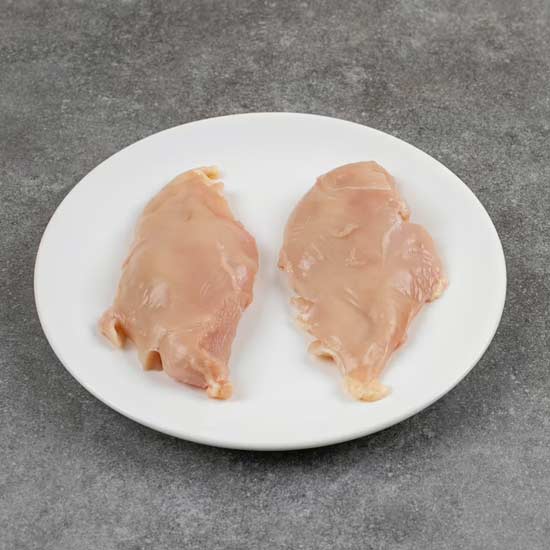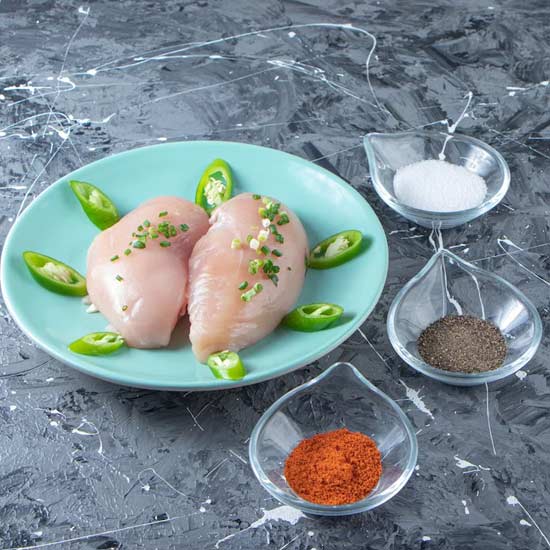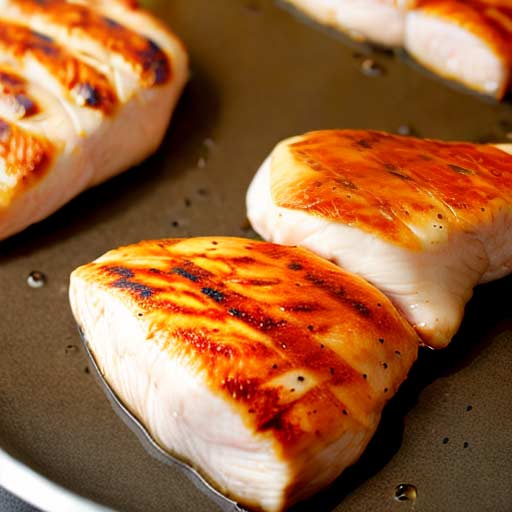Pounding chicken breasts before cooking them is a technique used to tenderize the meat and make it more juicy and flavorful. When chicken breasts are pounded, the muscle fibers in the meat break down, making it more tender and easier to chew.
In addition to tenderizing the meat, pounding chicken breasts can also help to create an even thickness, which can be beneficial when cooking. Chicken breasts can have varying thicknesses, which can result in uneven cooking times and potentially dry, overcooked meat. By pounding the chicken breasts to an even thickness, you can ensure that they cook more evenly and stay moist and juicy throughout the cooking process.

Another benefit of pounding chicken breasts is that it increases the surface area of the meat, allowing for more seasoning and flavor to be absorbed into the chicken. This can be especially helpful when cooking with marinades or spice rubs, as the chicken will absorb more of the flavor.
To pound chicken breasts, you can place them between two pieces of plastic wrap or in a plastic bag, and use a meat mallet or rolling pin to pound them until they are an even thickness. However, it’s important not to overdo it and pound the chicken breasts too thin, as this can make them dry and tough when cooked. A good rule of thumb is to pound the chicken breasts to about 1/2 inch thickness.
Overall, pounding chicken breasts is a simple technique that can help to improve the texture and flavor of your chicken dishes.
Pounding chicken breasts without a mess

Pounding chicken breasts can be a messy task, but there are a few tips to help minimize the mess:
- Use plastic wrap: Place the chicken breasts between two sheets of plastic wrap or in a resealable plastic bag before pounding. This creates a barrier that prevents the meat and juices from splattering all over your kitchen.
- Start gently: Begin pounding the chicken breasts with light, even pressure. This will help to distribute the force and reduce the chances of juices splattering.
- Pound on a solid surface: Choose a sturdy, flat surface such as a cutting board or counter top to pound the chicken breasts. Avoid using delicate or porous surfaces that can absorb juices or get damaged easily.
- Control the force: Apply controlled and steady pressure while pounding. Avoid using excessive force, as it can cause the chicken breasts to break apart or create a bigger mess.
- Clean as you go: Keep a damp cloth or paper towels nearby to quickly wipe up any splatters or juices that may escape during the pounding process. Cleaning up as you go will help maintain a tidy workspace.
By following these tips, you can minimize the mess while pounding chicken breasts, allowing you to focus on preparing delicious and tender chicken dishes without worrying about the cleanup.
Benefits of pounding chicken breasts

Here are some reasons why pounding chicken breasts can be beneficial:
- Even thickness: Chicken breasts can have varying thicknesses, which can make it difficult to cook them evenly. By pounding the chicken breasts to an even thickness, you can ensure that they cook more evenly, resulting in a more tender and juicy finished product.
- Faster cooking time: Pounded chicken breasts cook faster than thicker ones, which can save you time in the kitchen.
- More surface area: When you pound chicken breasts, you increase the surface area of the meat, which allows for more seasoning and flavor to be absorbed into the chicken.
- More tender meat: Pounding the chicken breasts can help break down the muscle fibers in the meat, making it more tender and easier to chew.
To pound chicken breasts, you can place them between two pieces of plastic wrap or in a plastic bag, and use a meat mallet or rolling pin to pound them until they are an even thickness. However, it’s important not to overdo it and pound the chicken breasts too thin, as this can make them dry and tough when cooked.
Frequently asked questions and answers about pounding chicken breasts

Here are some frequently asked questions about pounding chicken breasts along with their corresponding answers:
- Why should I pound chicken breasts before cooking? Pounding chicken breasts helps to flatten them evenly, resulting in more uniform cooking and faster cooking times. It also tenderizes the meat, making it juicier and more flavorful.
- What is the purpose of pounding chicken breasts? Pounding chicken breasts helps to break down the muscle fibers, making them more tender and easier to chew. It also helps to create an even thickness, allowing for more consistent cooking and preventing overcooking.
- Does pounding chicken breasts make them more tender? Yes, pounding chicken breasts helps to tenderize the meat by breaking down the connective tissues and fibers. This makes the chicken breasts more tender and juicy when cooked.
- How does pounding chicken breasts affect cooking time? Pounding chicken breasts reduces their thickness, which leads to shorter cooking times. Thinner chicken breasts cook more quickly and evenly, preventing them from drying out or becoming tough.
- What tools can I use to pound chicken breasts? You can use a meat mallet, rolling pin, or the bottom of a heavy skillet to pound chicken breasts. Alternatively, you can place the chicken breasts between plastic wrap or in a resealable bag before pounding to prevent splattering.
- Should I pound chicken breasts for all recipes? Pounding chicken breasts is particularly beneficial for recipes that require quick and even cooking, such as sautés, stir-fries, and grilling. However, it is not necessary for all recipes, especially those that call for thin chicken cutlets.
- Can I skip pounding chicken breasts if they are already thin? If your chicken breasts are already thin, pounding may not be necessary. However, if they are uneven in thickness or you want to further tenderize the meat, light pounding can still be beneficial.
- Are there any alternative methods to tenderize chicken breasts? Yes, there are alternative methods to tenderize chicken breasts, such as marinating them in acidic ingredients like lemon juice or yogurt, using a meat tenderizer tool with small blades, or brining the chicken breasts before cooking.
- Does pounding chicken breasts affect the flavor? Pounding chicken breasts does not significantly affect the flavor. Instead, it helps to ensure that the meat cooks evenly, resulting in a more enjoyable texture and tenderness.
- Can I pound frozen chicken breasts? It is not recommended to pound frozen chicken breasts. It is best to thaw them completely before pounding to ensure even and proper cooking.
These frequently asked questions and their answers provide valuable information for readers seeking guidance on pounding chicken breasts.
Please follow us on linkedin. You can learn all best french food recipe and best Italian food recipe and best arabic food recipes and best canadian food recipes you can check our Reddit page. Don’t forget Fighting Obesity Magazine.

